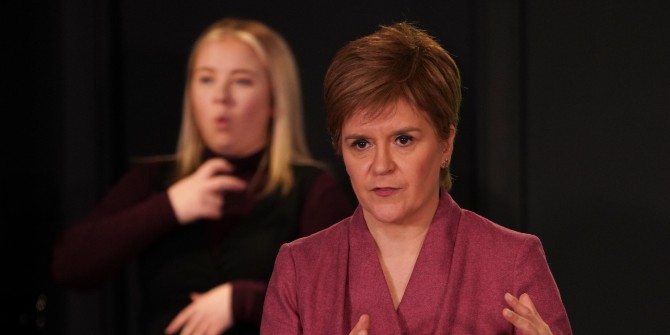Tom Shakespeare (LSHTM), Nicholas Watson, Richard Brunner, Jane Cullingworth (University of Glasgow), Shaffa Hameed (LSHTM), Charlotte Pearson (University of Glasgow), Nathaniel Scherer and Veronika Reichenberger (LSHTM) report on in-depth qualitative interviews conducted with 69 disabled people in England and Scotland, and with 28 key informants from infrastructure organisations in the voluntary and statutory sectors, about the impact of COVID-19, and measures taken to control it. They discuss the dislocations it has caused in everyday life; the failures of social care; the use of new technologies; and participants’ views on leadership and communication.
Disabled people may be at higher risk of the coronavirus, and of having worse outcomes from COVID-19. Additionally, the social response to the pandemic has gad a catastrophic impact on disabled people and their families. We were funded by UKRI to do a qualitative investigation of the impact of COVID-19 on disabled people in Britain. We talked to 69 disabled people in England and Scotland in June-August 2020. We also talked to care-givers of disabled children, and to 28 people who worked for disability organisations, or worked in education, health, or social services. Here we discuss our findings using what seemed to us to be the four most urgent messages.
First, everyday life has been disrupted. People described how their health care and support had changed significantly. Routine rehabilitation sessions were cancelled. Attempts to replicate these via video conference or phone were not perceived to be particularly successful. Many annual check-ups were cancelled, raising the risk of preventable medical problems being missed. Provision of assistive devices was severely affected. All this may lead to lack of functioning and increased dependency.
Disabled people appear to have been an afterthought in the response to COVID-19.
People were fearful about the virus. Many found it impossible to practise proper social distancing. People who were hard of hearing talked about the problems face coverings caused: transparent masks for lipreading have been in very short supply, leaving people excluded from the spoken world. Disabled people appear to have been an afterthought in the response to COVID-19. For example, we heard how provision was often made for non-disabled children who were learning from home, but not, at first, for children with special educational needs and disabilities, and learning materials were often inaccessible or inappropriate. Personal Protective Equipment (PPE) was provided for hospitals, but not for care homes, and then in care homes, but not for homecarers and personal assistants. Some disabled people’s organisations had to step in and source PPE for their members.
Second, our respondents said that social care has failed to respond effectively. Our research participants described how the pandemic and protective measures had led to increased reliance on their family and other informal carers. First was the closure, or suspension of day centres, day services and large sections of the social care system, large numbers of social care contracts were cancelled, put on hold, or severely limited. Second, some of our participants were anxious about having too many people coming into their own homes and wanted to reduce contact. As a result, they preferred relying on family members.
Social services appear to have been largely absent in some authorities. People told us how for some funding for their normal support services had been stopped completely and they had been left without any other alternative. Others had been offered phone support. If new needs arose it was often hard to get support. The pandemic has illuminated the fragility of social bonds for disabled people, particularly people with intellectual disabilities. Once funding and staffing are withdrawn, a person might be isolated, spending most of the day alone or inside, and with no meaningful activity. This causes increased anxiety and loss of confidence. For many we spoke to, with limited social options, boredom was one of the key features of the lockdown period.
These issues would have been much worse but for the role played by the third sector. At the start of the pandemic, many organisations completely changed the way they work, filling in the gaps left by social care and helping people’s mental health and wellbeing, and also providing direct services: PPE, food, digital devices.
Third, Zoom and other digital technologies have become very important. This has benefitted many disabled people, because it has removed access barriers. But disabled people face a digital divide that is twice as bad as that faced by non-disabled people. The best disability organisations understood the threat of a digital divide, and moved fast to prevent it. Entirely new online networks, such as “The Staying Inn” have been established. Online access can do many things. But it cannot replace human touch and connection. Children crave to be in school with their peers. Adults want to go to work, or to day centres, to see their friends.
Finally, participants felt there had been failures of communication and leadership. There is frustration over the actions of the UK government. Many people were also unsure about how to protect themselves. The science about COVID-19 has been evolving, but the messaging as to which people needed to shield and which did not have to continued to be unclear. Voluntary organisations and schools have received conflicting information, often at the very last minute. Many disabled people’s organisations and other community groups have played a key role in getting the right information across.
Government daily briefings were not sufficient to help people with learning difficulties in particular to understand what they should do differently. Nor has there been routine sign language interpretation of UK government briefings, which sends a very negative message. The Scottish Government has done better.

Our data suggest that many disabled people and their families have felt abandoned and forgotten during the pandemic. In many cases their needs were not protected and the response of the state has compromised their human rights. Such needs have to be fully considered in COVID-19 responses – health, education, social care. Decisions should be communicated in accessible formats. Local authorities should make it clear that social care packages will be fully reinstated and resources will be invested to address the backlog in social care assessments. The re-establishment of COVID-19-safe social supports and services is urgently needed. The third sector need to be supported, to ensure it can continue to provide help to disabled people and their families. In the longer term, the social care system has been broken for some time; its vulnerability has been exposed by the pandemic. In order to achieve good quality social care provision, secure funding is required.
Policymakers and social care providers must work collaboratively with disabled people and their organisations to address their needs. Post-pandemic social change is required to enable disabled people not only to regain what has been lost through the pandemic, but also to gain full citizenship rights in the UK.
This post draws on the authors’ paper (pre-print) available here. It represents the views of the authors and not those of the COVID-19 blog, nor LSE and was first published at LSE British Politics and Policy.





